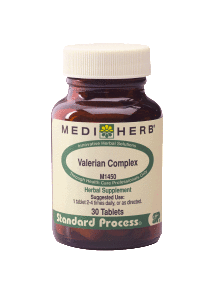- support nervous system health
- obtain relief from occasional sleeplessness
- promote relaxation
- ease the effects of temporary or occasional stress ∆
| Content | Product # |
|---|---|
| 40 Tablets | M1452 |
Suggested Use: 1 tablet 2 – 4 times daily, or as directed.
SERVING SIZE: 1 TABLET
SUPPLEMENT FACTS
| Amount Per Serving | %DV | |
|---|---|---|
| † Daily Value (DV) not established. | ||
| Calories | 3 | |
| Calcium | 40 mg | 4% |
| Valerian root & rhizome 5:1 extract fromValeriana officinalis root & rhizome 700 mg | 140 mg | † |
| Passion Flower herb 5:1 extract fromPassiflora incarnata herb 500 mg | 100 mg | † |
| Spiny Jujube seed 10:1 extract fromZizyphus spinosa seed 900 mg | 90 mg | † |
Other Ingredients
Calcium acid phosphate, cellulose, hypromellose, magnesium stearate, maltodextrin, silica and sodium starch glycollate.
Caution: Not to be used during pregnancy and lactation unless otherwise directed by a qualified health care professional.
For other contraindications and cautions specific to this product, please refer to the Contraindications and Cautions for MediHerb Botanicals.
Valerian and Passionflower Quality
Valerian Quality Issues
Valerian (Valeriana officinalis) contains valerenic acids (predominantly acetoxyvalerenic and valerenic acid and low levels of hydroxyvalerenic acid) and valepotriates (valtrate and isovaltrate). While other species of Valerian may contain the valepotriates only true Valerian contains the valerenic acids. MediHerb has developed a unique HPLC analytical method to determine the levels of valerenic acids and valepotriates in Valerian. This method can also determine the level of the baldrinals (valtrate degradation products) which are an indicator of a poor quality herb. By using this analytical method on all its Valerian products, MediHerb ensures that these products contain high levels of valerenic acids and valepotriates, with no baldrinals.
Passionflower Quality Issues
There are over 500 species of Passion Flower, which include the edible passionfruit and varieties grown for their characteristic flowers. The preferred medicinal species is Passiflora incarnata which is native to the Americas and has many common names, including ‘Maypop’ and ‘Purple Passion Flower’. The original forms of this plant have flowers varying in color from pale lavender through to dark violet. There is also a white-flowered form which appears in the wild, as well as in cultivation, and is sold as P. incarnata “Alba”.
During routine analysis in the MediHerb Research Laboratory it became evident that there were two different phytochemical profiles of Passion Flower being encountered. The samples varied in the flavonoid constituents which are among the proposed therapeutically active components. In conjunction with Southern Cross University (Australia) it was determined that the different flavonoid profiles were related to the color of the flowers (purple or white). The clinical evidence for Passion Flower is derived from European clinical trials and the corresponding phytochemical profiles have been published. By using LC/MS it was determined that these profiles matched that of the purple-flowered form. Two of the peaks are consistent between the two different forms, however, the remaining eight or more flavonoids are different. Without using at least HPLC, or ideally LC/MS, this differentiation is easily missed and the inappropriate form of Passiflora incarnata might be used.
Please consult the product packaging label for the most accurate product information.
Δ These statements have not been evaluated by the Food & Drug Administration. These products are not intended to diagnose, treat, cure or prevent any disease.

